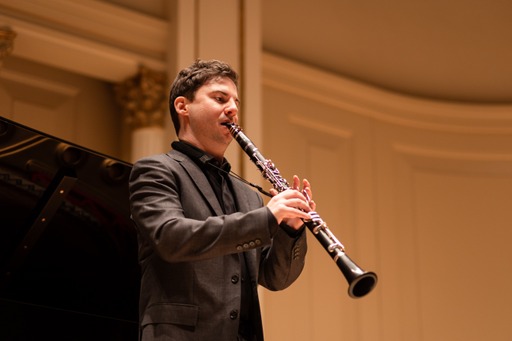Boutris and friends present the art of the clarinet at Carnegie Hall
At the start and finish of his Monday night recital in Carnegie Hall, clarinetist Sam Boutris pointed out that the clarinet had its start at the end of Mozart’s career. It was developed in the early 18th century out of an earlier baroque instrument, but it didn’t become reliable and flexible until late in Mozart’s life, just in time for him to compose his lovely Clarinet Quintet in A Major, K. 581. That was the final piece Boutris played, supported by the Aizuri Quartet, and this fine concert—which covered Schumann, Nielsen, Brahms, and a premiere—began with Mozart as well.
That opener was Boutris’ own arrangement of “Un’aura amorosa,” Fernando’s Act I aria from Cosi fan tutte. Accompanied by pianist Sophiko Simsive for this and the entire first half, it was the only one across the seven pieces where things didn’t quite work. Playing the vocal line fairly straight, Boutris seemed caught between a decision to follow the original vocal phrasing or to play it in a manner more appropriate for the clarinet—an interpretation he seemed to still be thinking through.
This pleasant but slightly awkward start melted away before the dynamic, expressive beginning of Schumann’s Fantasiestücke, Op. 73. Immediately in his element, Boutris’ phrasing, rhythm, and dynamics matched his fluid, mellifluous sound. The push and pull of Schumann’s melodies and moods clearly energized him.
Louis Cahuzac’s vibrant Cantilène followed. A famed clarinetist as well as composer, the music has a vocal foundation but is idiomatic to the instrument, and Boutris poured through it. In contrast to the Mozart aria, his playing was completely confident, natural, and fluid, the instrument a mere extension of his thinking and breathing.
Sandwiched between a solid performance of Nielsen’s brief Fantasy for Clarinet and Piano and Brahms’ Clarinet Sonata No. 2 was the world premiere of Forest and Sky, composed for Boutris by Sheridan Seyfried. Seyfried spoke briefly about the piece, and noted Brahms as an inspiration. Indeed the piece had the same forward-plunging stance and a similar, through streamlined, harmonic motion. The title came across in two clear sections that had a palpable feeling of earthiness and then flight, and the writing brought out the full expressive range of Boutris’ sound. It was impressive how finely he modulated his color through breath support and control of his air column.
Forest and Sky was an excellent lead-in to a robust performance of the Brahms sonata. Boutris played sweetly, but still conveyed that particular Brahmsian sense of urgency, not just in the middle movement but the opening Allegro amabile. Simsive had been an able accompanist up to this point, and shined here, playing with terrific energy and superb articulation.
The accompaniment for Mozart’s Clarinet Quintet was just as fine. The Aizuri Quartet is one of the many excellent young string quartets on the scene, with all players displaying flexibility, agility, and a beautiful sound. The contrast between their gleaming timbres and Boutris mellow one was bracing and vivid, while the musical compatibility was tight.
One moment in the modulatory sequence of the opening Allegro movement was a little hesitant, as if the musicians were navigating through some momentary miscoordination, but all the rest of the playing was excellent. Especially after the romanticism of the first half, it was good to hear Boutris return to Mozart, this time with a gentle elegance, light-footed spring, and an ideal sense of a conversation between the musicians themselves and together with Mozart.
